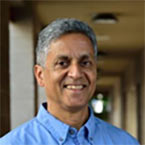Upcoming IEEE ASI Webinar
IEEE Autonomous Systems Initiative Webinar
Title: Computational Self-awareness and Self-organization:
A Paradigm for Building Adaptive, Resilient Computing Platforms
Date: 30 November 2022
Time: 8:00 AM (PST), 5:00 PM (CET, Central Europe Time)
Duration: Approximately 1 Hour
Speaker: Dr. Nikil Dutt
ASI Website
Abstract:
Self-awareness and self-organization have a long history in biology, psychology, medicine, engineering and (more recently) computing. In the past decade this has inspired new self-aware/self-organizing strategies for building resilient computing platforms that can adapt to the (often conflicting) challenges of resiliency, energy, heat, cost, performance, security, etc. in the face of highly dynamic operational behaviors and environmental conditions. I will begin by outlining a computational self-awareness paradigm that enables adaptivity and which supports system resilience. Computational self-awareness is achieved through introspection (i.e., modeling and observing its own internal and external behaviors) combined with both reflexive and reflective adaptations via cross-layer physical and virtual sensing and actuations applied across multiple layers of the hardware/software system stack.
Next I will outline strategies for combining computational self-awareness with self-organization for life-cycle management of dependable distributed computing platforms. Our ongoing NSF/DFG Information Processing Factory (IPF) project applies principles inspired by factory management that combine self-awareness and self-organization for continuous operation and optimization of highly-integrated-but-distributed embedded computing platforms. While each IPF computational component exhibits autonomy through self-awareness, collections of IPF entities can self-organize; the resulting emergent behavior must be controlled to ensure guaranteed service even under strict safety and availability requirements. I will outline two use cases: i) End-to-end computational pipelines for a single autonomous IPF component, and ii) Truck platooning as an exemplar for distributed-but-coupled IPF autonomous systems. The talk will conclude with the opportunities and challenges arising from adopting computational self-awareness and self-organization for making complex computational systems more resilient and self-adaptive.
Biography:

Nikil Dutt is a Distinguished Professor of CS, Cognitive Sciences, and EECS at the University of California, Irvine, and also a Distinguished Visiting Professor of CSE at IIT Bombay, India. He received a PhD from the University of Illinois at Urbana-Champaign (1989). His research interests are in embedded systems, EDA, computer architecture and compilers, distributed systems, healthcare IoT, and brain-inspired architectures and computing. He has received numerous best paper awards and is coauthor of 7 books. Professor Dutt has served as EiC of ACM TODAES and AE for ACM TECS and IEEE TVLSI. He is on the steering, organizing, and program committees of several premier EDA and Embedded System Design conferences and workshops, and has also been on the advisory boards of ACM SIGBED, ACM SIGDA, ACM TECS and IEEE ESL. He is an ACM Fellow, IEEE Fellow, and recipient of the IFIP Silver Core Award.
For more information, please contact Lucio Marcenaro.



